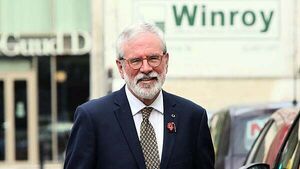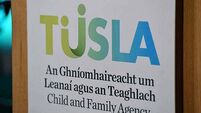Gerry Adams defamation case 'a cynical attempt to launder his reputation', High Court told

High Court reporters
Gerry Adams’ defamation case against the BBC is a cynical attempt to launder a reputation that he was in the Provisional IRA and sat on its army council, a barrister has told the High Court.
Paul Gallagher SC, for the BBC, made the remarks in his closing address to the jury in the former Sinn Féin leader’s action.
Mr Adams claims a BBC Spotlight programme and a related article published in 2016 defamed him by falsely accusing him of sanctioning British agent Denis Donaldson’s killing at a cottage in Glenties, Co Donegal, in 2006.
Mr Adams’s lawyers argue his reputation is that of a “peacemaker”, and the allegation represents an “unjustified attack” on his reputation. He insists he had no involvement with the death for which dissident republicans claimed responsibility in 2009.
The BBC denies it defamed Mr Adams.
Mr Gallagher on Thursday told the jury the case was about Mr Adams’s reputation, to be considered in deciding if the BBC acted fairly and reasonably in publishing the allegation, and – if the jury finds Mr Adams’ was defamed – assessing damages to be awarded.
The BBC argues the publication was fair and reasonable and in the public interest, a defence against a defamation action outlined in the Defamation Act 2009.
This defence falls under a constitutional protection of free speech – the jury’s decision may have consequences for freedom of expression, Mr Gallagher said.
The broadcaster also says that the Spotlight programme and related article did not mean the BBC said Mr Adams was responsible for sanctioning the murder of Mr Donaldson, that the claim was presented as an allegation.
Mr Gallagher said the case was a cynical attempt by Mr Adams to "launder" his reputation.
Counsel said that Mr Adams is attempting to say that his reputation is different to what he effectively acknowledged in evidence, that people have repeatedly said he was a member of the IRA and its army council.
"You don't have to decide if he was in that position, this is about reputation," he said.
Mr Gallagher said that if you have a reputation of being in the IRA and on its army council – as, he said, Mr Adams does – that is the reputation you have. “It's not just a label, it is a reality,” he said.
He said Mr Adams had put himself forward as a “peacemaker” with any mention of the reality of which his reputation is borne.
“Somebody can’t shed that reputation and come into court and give evidence suggesting that it's not there, and present a picture of events that just ignores that reality,” he said.
Mr Gallagher said that the statements in the Spotlight programme were presented as an allegation, and should not be taken to mean – as Mr Adams pleads – that the BBC said he sanctioned the murder of Mr Donaldson.
He said the words cannot be taken in isolation, but rather in the context of the programme.
He said there cannot be a situation where people in the media are afraid to speak, because of the consequence of being sued.
Counsel said that “if we want the society that I believe all of us want”, then we depend on the “Jennifer O’Learys of the world” — referencing the journalist behind the programme -- to have the courage and persistence to stand by what they have unearthed, and put before the public to form their own views.
Mr Gallagher reiterated Ms O’Leary’s evidence that she had multiple sources corroborating the allegation against Mr Adams. He said the defence’s assertion that it was based on a single source was “completely wrong”.
Mr Gallagher argued there was a strong public interest in the story. He said it was not a “tittle-tattle story” of disputable public interest, and asked how the BBC could not have published the allegation.
He said the story was motivated by good faith. “This was done not to make an allegation against somebody for the sake of it,” he said.




